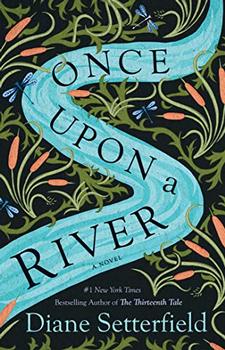Book Club Discussion Questions
In a book club? Subscribe to our Book Club Newsletter and get our best book club books of 2025!
For supplemental discussion material see our Beyond the Book article, The Ferrymen of Souls and our BookBrowse Review of Once Upon a River.
Please be aware that this discussion guide will contain spoilers!
- The Swan Inn, Buscot Lodge, and the towns and villages along the river Thames create a very specific atmosphere for the story that unfolds. What role does the Swan itself play? Could this story have taken place anywhere else?
- To judge by such details as photography and transport as described in the novel, the events appear to be set in the 1870s or thereabouts. Could the novel have been set at another time in history? What would have had to be different if the author had chosen another period?
- What is the significance of the river?
- By the time Vaughan had written a concise two-page account of Amelia's kidnapping to his father in New Zealand, "the horror of it was quite excised." What effect does the act of storytelling have on Vaughan? What about the other characters?
- A wedge is driven between the Vaughans as they struggle to come to terms with the loss of Amelia. In the end, what brings them together? How?
- How does Robert Armstrong, raised outside family life in circumstances of financially cushioned neglect, turn out to be such a good man?
- "Sometimes I think there is nothing more a man can do. A child is not an empty vessel, Fleet, to be formed in whatever way the parent thinks fit. They are born with their own hearts and they cannot be made otherwise, no matter what love a man lavishes on them." Do you agree with Armstrong's lament at the end of the book? Is it possible if he had been a different kind of father things might have turned out differently for Robin?
- Is Lily White responsible for her actions?
- Consider the importance of family in the novel. What does it mean to Robert Armstrong? What does family mean to Daunt and Rita? And Victor? What about Lily?
- It's easy to get carried away talking about the key families in the plot, the Vaughans, the Armstrongs, and Lily and her brother, but what about the family at the inn? What important functions do they perform? And what do the drinkers - largely unnamed - add?
- Storytelling is central to Once Upon a River. The story of Quietly the ferryman is an invention of the author, but it contains many elements from traditional or mythological tales. Does it remind you of any other stories in particular?
- How many types or styles of story are told in Once Upon a River? Be as wide in your interpretation of "story" as you like!
- Folk beliefs are still alive on the riverbank - changelings, witches, and dragons are all still real to some, and the Armstrongs believe Bess has a Seeing eye. What are the real-life consequences of these stories? Which characters have faith in these stories, and which do not? How does it affect their actions?
- In the context of women's lives in the nineteenth century, what do you make of Rita's reluctance to marry? What brings her to reconsider?
- Is the fortune-telling pig mere light relief or something more?
- The identity of the girl is one of the driving mysteries of Once Upon a River. What were your early thoughts about who she really was, and did they alter as the story developed? What did you think of the way this question was resolved at the end?
- The ending elaborates on the "return to life" of children apparently drowned. Did this come as a surprise to you?
Enhance Your Book Club
- The art of oral storytelling is at the heart of Once Upon a River. It used to be central in every human society, but with the advent of literacy, and then TV and cinema, it has become rare to gather to listen to someone tell a story from memory. How about resurrecting the art by devoting part of a book club meeting to telling stories aloud?
- Man is said to be the storytelling ape. Stories are the way people make sense of the world and their place in it. Are there stories (family stories or personal ones) that have shaped you and your sense of the world?
- Diane Setterfield's book The Thirteenth Tale was made into a BBC film starring Vanessa Redgrave, and Once Upon a River is to be a television series. Whom would you cast to bring the mysterious events of the Swan in Once Upon a River to life? Share your casting picks for Margot, Joe, Jonathan, Mr. and Mrs. Armstrong, Mr. and Mrs. Vaughan, Rita, Daunt, Lily White, Victor, and the others with your book club.
- Many of the settings in the book are based on real places that stand today in England: Ye Olde Swan, still a working pub; Buscot House (the model for Buscot Lodge), now owned by the National Trust and open for visits; and Kelmscott Manor, a grand house also open to visitors, are all situated along the Thames in Oxfordshire. Should you be so lucky to go, start planning your trip at www.experienceoxfordshire.org. And if you can't go in person, how about a virtual trip down the Thames at www.thames.me.uk?
- Learn more about author Diane Setterfield by visiting her website at www.dianesetterfield.com, or following her on Facebook.
Unless otherwise stated, this discussion guide is reprinted with the permission of Atria Books.
Any page references refer to a USA edition of the book, usually the trade paperback version, and may vary in other editions.
